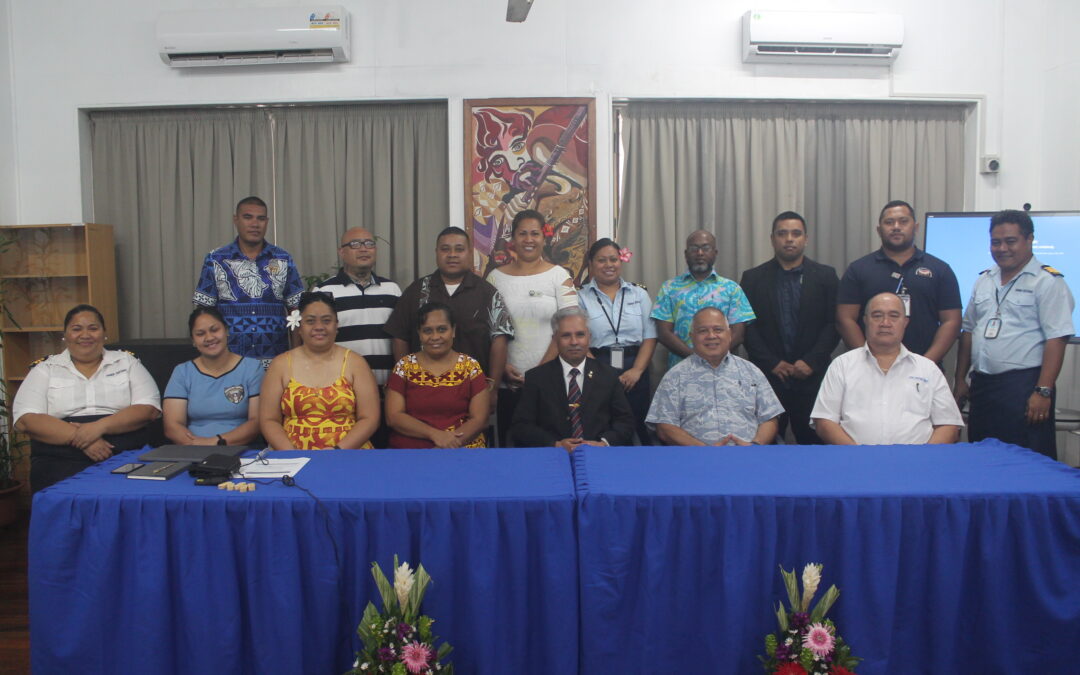Suva, Fiji: The Oceania Customs Organisation (OCO) Secretariat is implementing a World Customs Organization (WCO) initiative to reduce trade delays and boost economic growth across Pacific Island nations. The Time-Release Study (TRS) capacity-building program aims to tackle border bottlenecks that currently slow down imports and exports as well as driving up costs for businesses and consumers throughout the region.
The program, which started yesterday in Apia, Samoa and will end on 11th April 2025, is a critical investment in the region’s economic infrastructure. By identifying and eliminating unnecessary delays in cargo processing, participating nations will enjoy economic benefits such as reduced business costs, improved supply chain reliability, and enhanced trade competitiveness.
“Previous studies have shown that reducing border clearance times by just 24 hours can cut trade costs by up to 1.5 percent,” said Nancy T. Oraka, Head of the OCO Secretariat. “For our island economies, where imported goods often make up a significant portion of consumer spending, these savings translate directly to more affordable goods and enhanced living standards for our communities.”
Research indicates that border inefficiencies can increase the cost of traded goods by up to 15 percent in developing economies. The TRS methodology, developed by the World Customs Organization (WCO), provides a scientific approach to measuring and reducing these inefficiencies. By accurately tracking the time taken for goods to clear customs processes, administrations can implement targeted reforms that deliver immediate economic benefits.
The two-week program includes hands-on implementation of a real-world TRS in Samoa, providing immediate benefits to the host country while building regional expertise. Samoa’s trade sector, which accounts for approximately 60 percent of its GDP, stands to gain significant efficiencies from the process improvements that will result from this study.
“When we streamline border processes, we’re not just moving paperwork faster—we’re helping businesses reduce inventory costs, improving access to vital materials, and making our exports more competitive in global markets,” Ms. Oraka explained.
The initiative is expected to deliver multiple economic impacts:
- Reduced trade costs through elimination of unnecessary delays and procedures
- Improved predictability in supply chains, allowing businesses to reduce buffer stocks
- Enhanced transparency in border processes, reducing opportunities for corruption
- Increased trade volume through improved competitiveness and efficiency
- Accelerated economic integration within the Pacific region
For smaller island nations like the Federated States of Micronesia (FSM), Kiribati, Nauru, Niue, Samoa, and Tuvalu, the economic impact could be transformative. These nations, where imports often exceed 50 percent of GDP, have the most to gain from more efficient border processes. Studies from similar economies suggest that comprehensive customs modernisation can boost trade volumes by up to 7.5 percent and contribute an additional 0.5 percent to annual GDP growth.
“This initiative represents one of the highest-return investments we can make in our regional economic infrastructure,” noted Ms. Oraka. “When a container of goods clears customs in hours rather than days, the benefits ripple through the entire economy.”
About OCO: The Oceania Customs Organisation is the regional body for Customs administrations in the Pacific region. OCO works to enhance the capacity and capability of its members in border security, trade facilitation, and revenue collection.
Fiji Revenue and Customs Service Building 3, Level 1| Lot 1, Corner of Queen Elizabeth Drive & Ratu Sukuna Road, Nasese| Private Mail Bag, Suva, Fiji | Tel: (679) 3313110 Fax: (679) 3313126 |
